.

Promenade: Guy Pène du Bois (1884-1958), 1935, oil on canvas, 36 1/2 x 29 1/4 ins. (Indianapolis Museum of Art)
They sit on the stairs and cry.
They hear accidents a week away
screaming "Pierrot Lunaire! why
am I sitting at home while you are
there?" They let their hands fall over
the bannister with an awed sigh or
clear themselves by moaning "I'm in
this too deep. I'll never see the ring
hit the bottom of the well and heaven
will be denied my kind!" And this
becomes sure for them. Even the grass
gets rusty; cobwebs fill the dark trees.
But strong as a violet some deny order.
Wear no pattern but the hazardous
polka dot or stripe. Eat their emeralds.
They hear accidents a week away
screaming "Pierrot Lunaire! why
am I sitting at home while you are
there?" They let their hands fall over
the bannister with an awed sigh or
clear themselves by moaning "I'm in
this too deep. I'll never see the ring
hit the bottom of the well and heaven
will be denied my kind!" And this
becomes sure for them. Even the grass
gets rusty; cobwebs fill the dark trees.
But strong as a violet some deny order.
Wear no pattern but the hazardous
polka dot or stripe. Eat their emeralds.
Frank O'Hara (1926-1966): Women, probably written 1950 or 1951, first published in Generation, Spring 1951; from The Collected Poems of Frank O'Hara, ed. Donald Allen, 1971
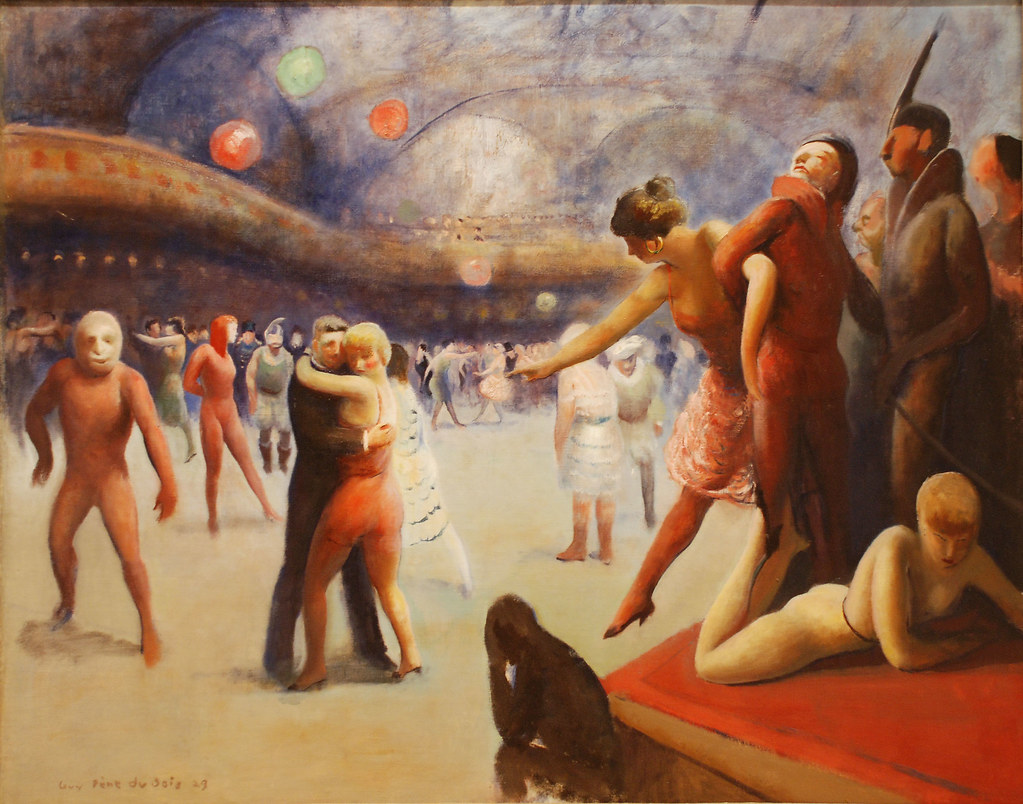
Bal des Quatre Arts: Guy Pène du Bois (1884-1958), 1929, oil on canvas; image by Irina Haynes, 9 May 2012
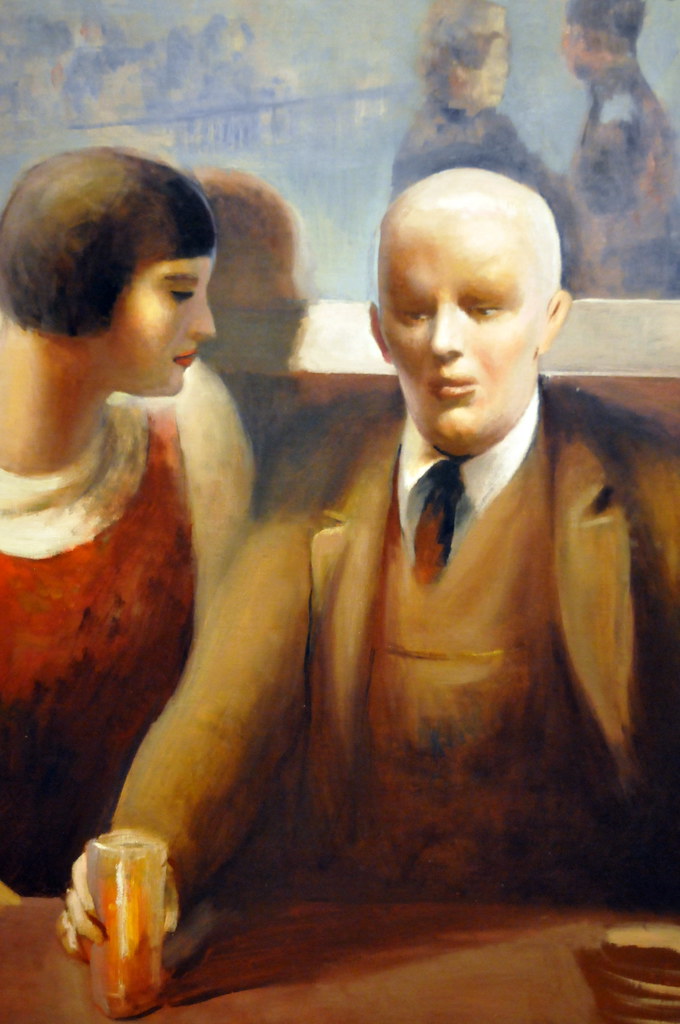
Pierrot Tired: Guy Pène du Bois (1884-1958), 1929, oil on canvas; image by mbell1975, 9 January 2011 (Corcoran Art Gallery, Washington D.C.)
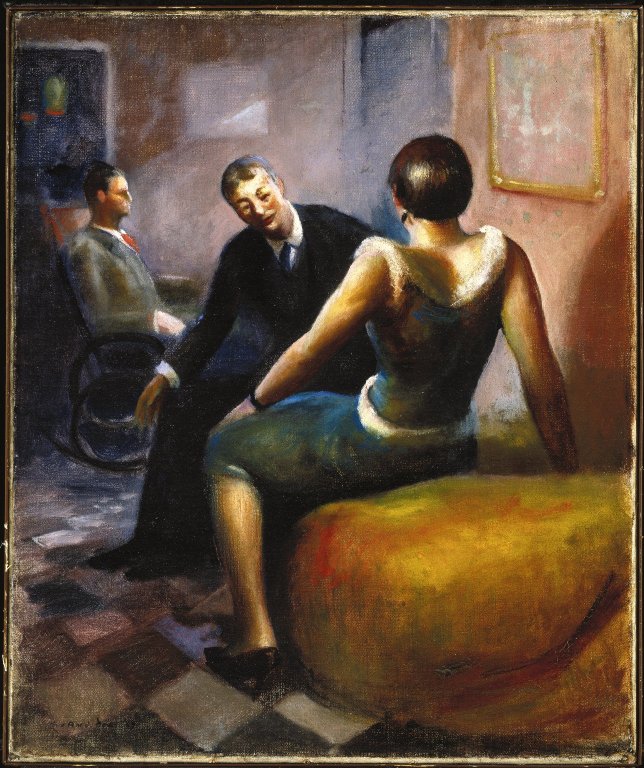
Evening: Guy Pène du Bois (1884-1958), 1929, oil on canvas, 55.7 x 46.7 cm (Brooklyn Museum)
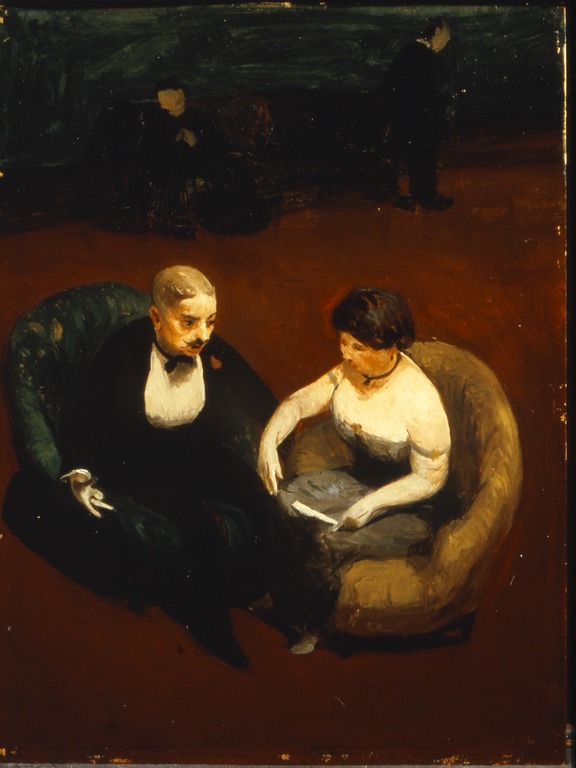
Automobile Tires: Guy Pène du Bois (1884-1958), 1915, oil on panel, 50.5 x 38.1 cm (Brooklyn Museum)
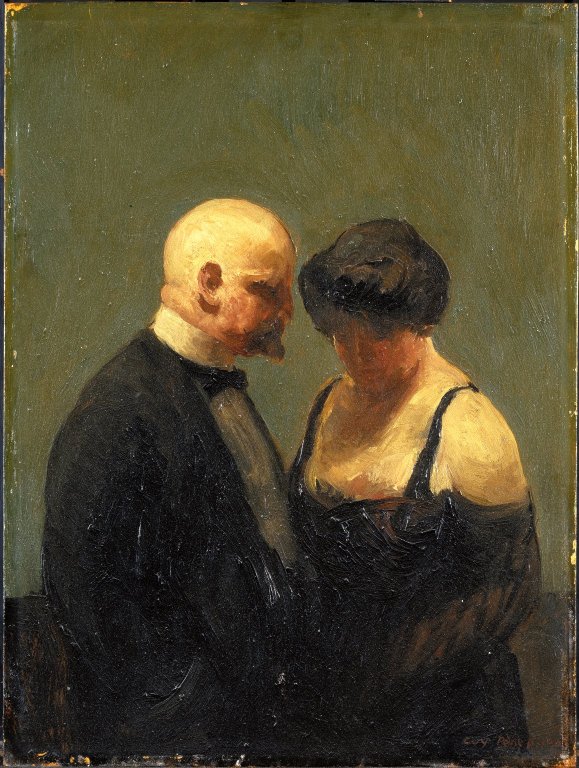
The Confidence Man: Guy Pène du Bois (1884-1958), 1919, oil on plywood panel, 50.8 x 38.1 cm (Brooklyn Museum)
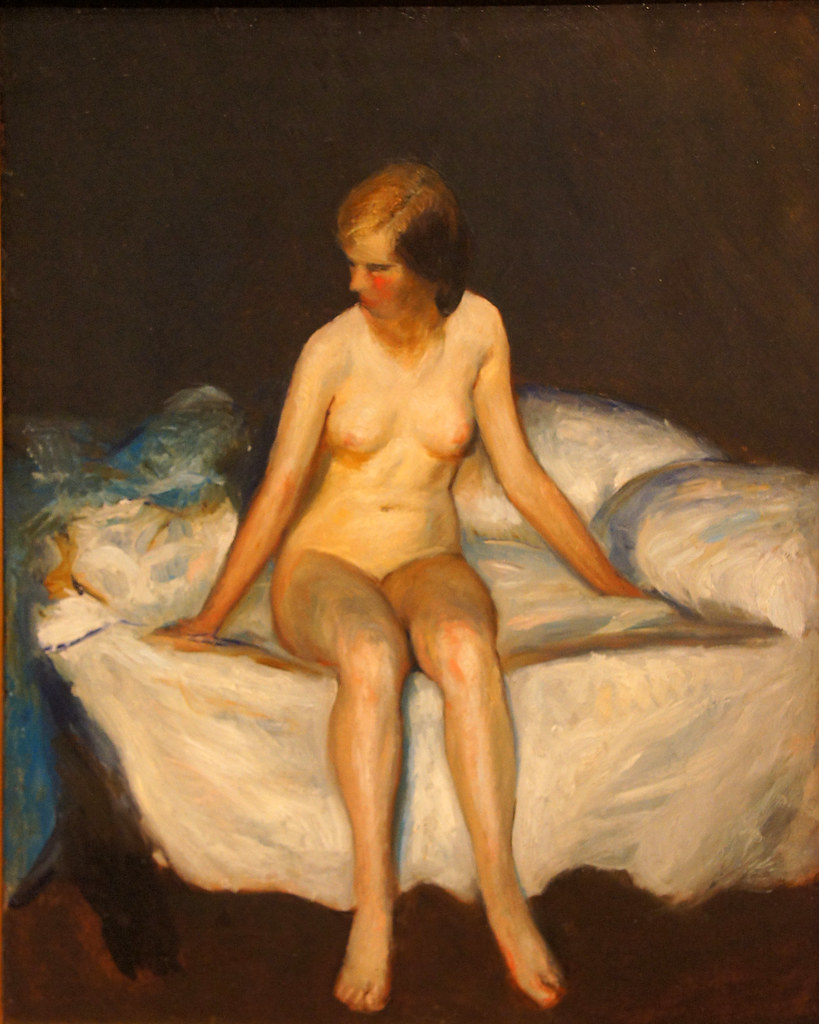
Seated Nude: Guy Pène du Bois (1884-1958), c. 1919, oil on wood panel; image by Alllie Caulfield, 8 October 2011 (De Young Museum, San Francisco)
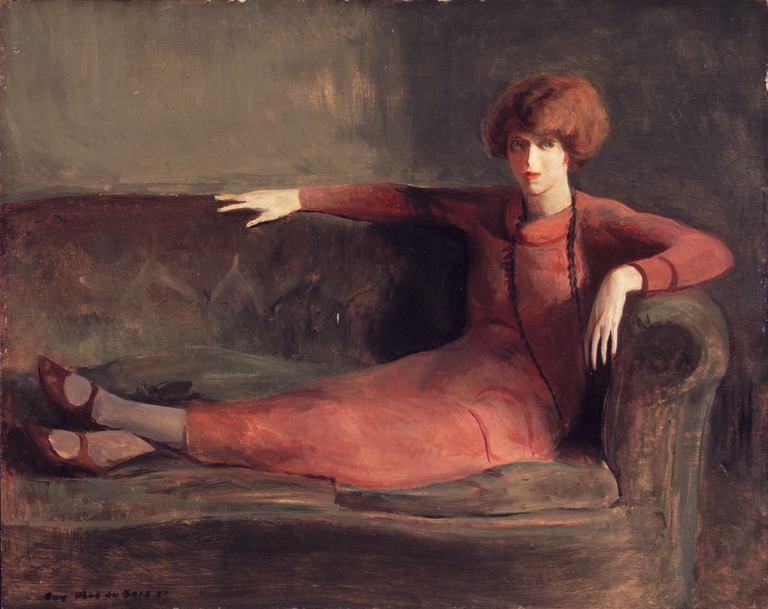
Woman on Sofa: Guy Pène du Bois (1884-1958), 1922-1927, oil on panel, 66 x 78.7 cm (Brooklyn Museum)
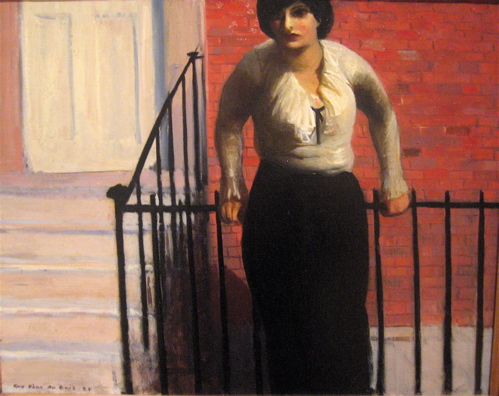
An American Oriental: Guy Pène du Bois (1884-1958), 1921, oil on panel, 50.8 x 63.9 cm; image by Beesnest McClain, 20 February 2009 (Los Angeles County Museum of Art)

Americans in Paris: Guy Pène du Bois (1884-1958), 1927, oil on canvas, 73 x 92.4 cm (Museum of Modern Art, New York)

Café du Dome: Guy Pène du Bois (1884-1958), 1925/1926, oil on wood, 55.2 x 46 cm (Chester Dale Collection, National Gallery of Art, Washington D.C.)

Hallway, Italian Restaurant: Guy Pène du Bois (1884-1958), 1922, oil on canvas, 64 x 51 cm (Chester Dale Collection, National Gallery of Art, Washington D.C.)

La Rue de la Santé: Guy Pène du Bois (1884-1958), 1928, oil on canvas, 92 x 73.3 cm (Chester Dale Collection, National Gallery of Art, Washington D.C.)
Shovel Hats: Guy Pène du Bois (1884-1958), 1923, oil on plywood, 50.7 x 89.6 cm (Smithsonian Museum of American Art)

Woman Reading Paper: Guy Pène du Bois (1884-1958), 1939, oil on canvas; image by Cea, 5 February 2012

The Mirror: Guy Pène du Bois (1884-1958), n.d., oil on canvas; image by Cea, 24 July 2012
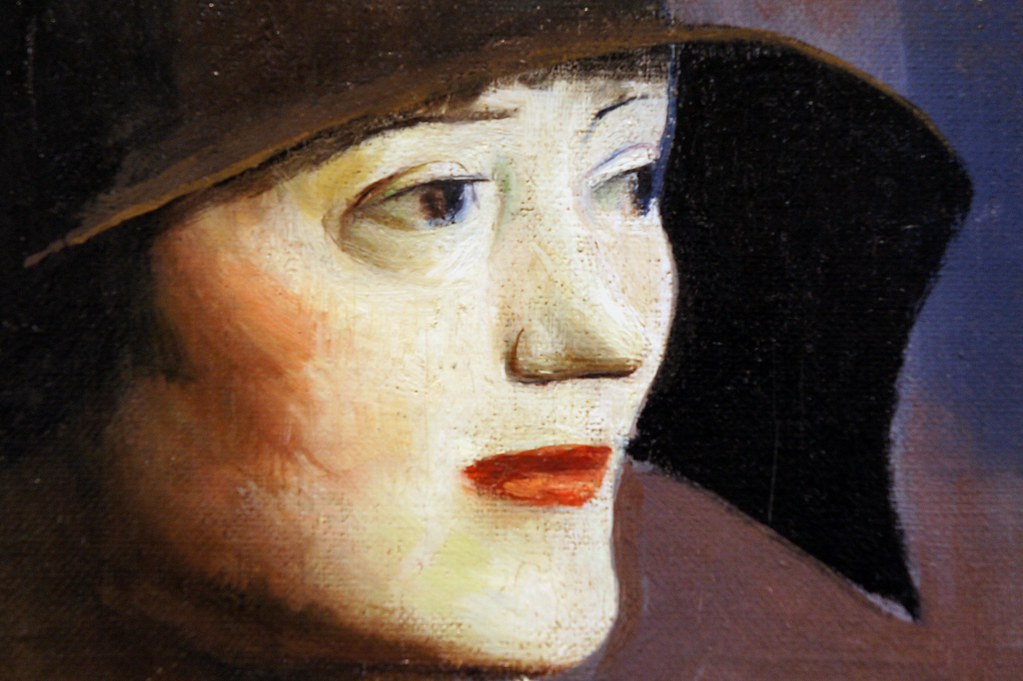
Mr and Mrs Chester Dale Dine Out (detail): Guy Pène du Bois (1884-1958), 1924, oil on canvas; image by Regan Vercruysse, 25 February 2011 (Metropolitan Museum of Art, New York)
Portrait of Isabel Bishop: Guy Pène du Bois (1884-1958), 1924, oil on canvas, 120 x 89.6 cm (Smithsonian Museum of American Art)

Blue Armchair: Guy Pène du Bois (1884-1958), 1923, oil on plywood panel, 25 x 20 ins. (The Phillips Collection)
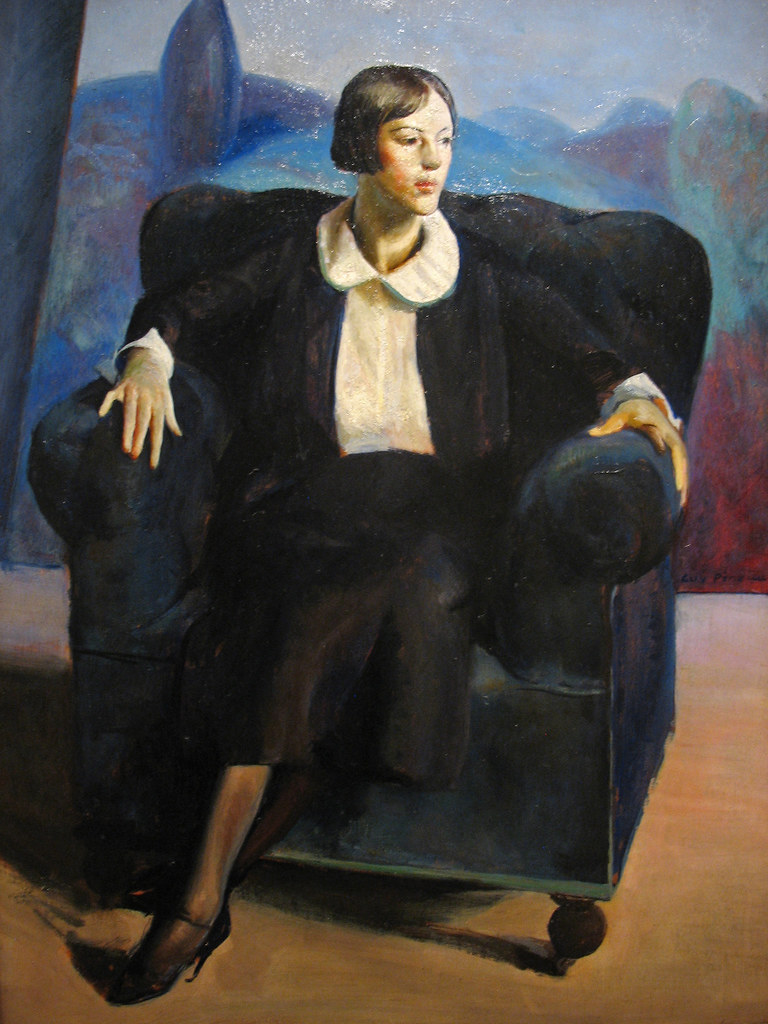
The Blue Chair: Guy Pène du Bois (1884-1958), 1923, oil on wood; image by Peter Eimon, 5 February 2012 (Metropolitan Museum of Art, New York)
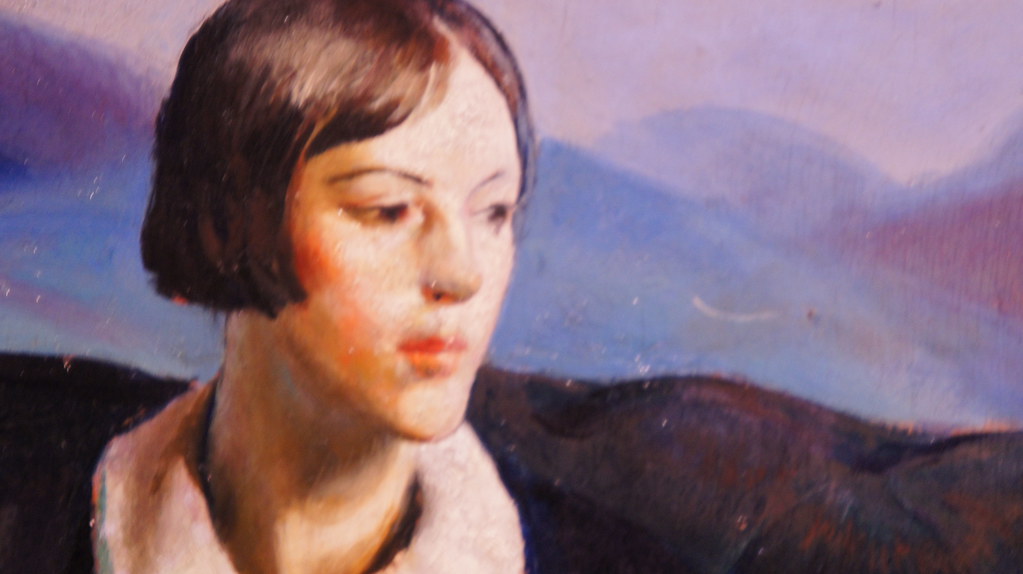
The Blue Chair (detail): Guy Pène du Bois (1884-1958), 1923, oil on wood; image by Regan Vercruysse, 24 February 2011 (Metropolitan Museum of Art, New York)

The Arrivals: Guy Pène du Bois (1884-1958), 1918 or early 1919, oil on plywood panel, 24 x 20 ins. (The Phillips Collection)

Two on a Boulevard: Guy Pène du Bois (1884-1958), 1927, oil on canvas, 21 3/4 x 18 1/8 ins. (The Phillips Collection)

Club Meeting: Guy Pène du Bois (1884-1958), 1936, oil on canvas, 61.3 x 51.0 cm (Pennsylvania Academy of Fine Arts)

People: Guy Pène du Bois (1884-1958), 1927, oil on canvas, 114.6 x 147.0 cm (Pennsylvania Academy of Fine Arts)

Opera Box: Guy Pène du Bois (1884-1958), 1926, oil on canvas, 143.5 x 113 cm (Whitney Museum of American Art, New York)
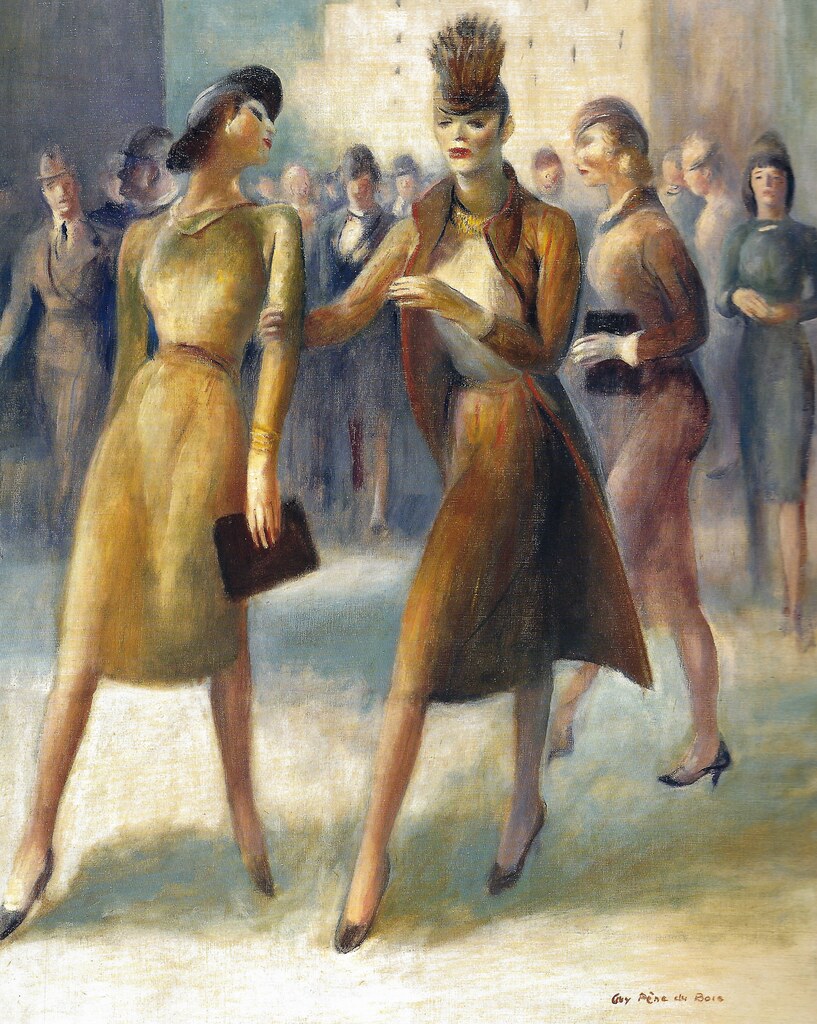
42nd Street: Guy Pène du Bois (1884-1958), 1945, oil on canvas, 81.2 x 66 cm; image by mbell1975, 9 December 2011 (Colección Carmen Thyssen-Bornemisza, Museo Thyssen-Bornemisza, Madrid)

The Life Soldier: Guy Pène du Bois (1884-1958), 1922, oil on canvas, 63.5 x 50.8 cm (Bowdoin College Museum of Art)
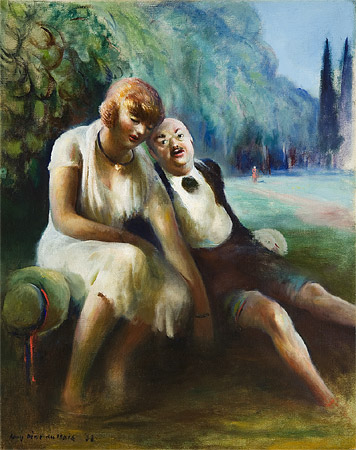
The Couple: Guy Pène du Bois (1884-1958), 1932, oil on canvas; image by Gunther Stephan, 3 August 2010
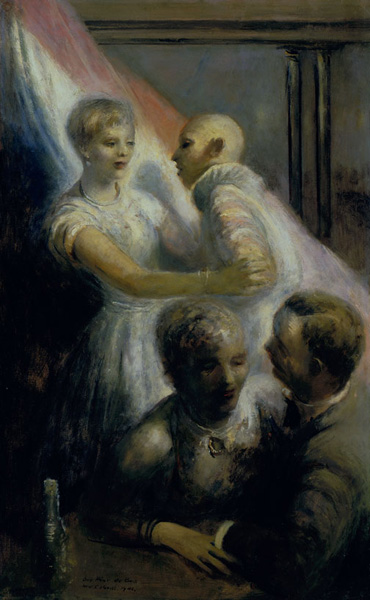
New Orleans: Guy Pène du Bois (1884-1958), 1946, oil on canvas; image by Gunther Stephan, 21 August 2008

Trapeze Performers: Guy Pène du Bois (1884-1958), 19431, oil on canvas, 63.5 x 50.8 cm (Butler Institute of American Art)

Fog, Amagansett: Guy Pène du Bois (1884-1958), 1938, oil on canvas, 25 x 30 1/8 cm (Wichita Art Museum)

Untitled (Woman in Brooklyn): Guy Pène du Bois (1884-1958), 1926, oil on canvas; image by Irina (irinaraquel), 12 January 2013

Woman's Head: Guy Pène du Bois (1884-1958), n.d., oil on paper, 61.2 x 45.2 cm (Cleveland Museum of Art)

Portrait of Betty Parish at 19: Guy Pène du Bois (1884-1958), c. 1929, oil on canvas, 20 x 16.25 ins. (Asheville Art Museum)

Portia in a Pink Blouse: Guy Pène du Bois (1884-1958), 1942, oil on canvas, 32 1/4 x 29 1/2 ins. (Indianapolis Museum of Art)


Bulls-eye. This will give me great pleasure forever and I think Frank O'Hara and Guy Pene du Bois would both think this was terrific. Curtis
ReplyDeletegreat stuff Tom!
ReplyDeleteWOWOW !
ReplyDeletevery refreshing to see this-all .... O'Hara NYC piece juxtaposed with a few of Guy Pène du Bois' NYC pieces.
Guy Pène du Bois new to me. thanks.
another thought ? would be interesting to see (play with) connecting some more O'Hara pieces out of that Allen edited (an huge book)
with another New York painter... George Bellows
and tickle-my-fancy with adding some Balthus ?
I mean... it gets so damn boring to see (everywhere)
the Duchamp-Dada-Surrealism crappo to there ?
Tom,
ReplyDeleteGuy Pène du Bois's wonderful paintings new to me too -- each one some kind of wordless drama, an unfolding moment now gone (but also now here), maybe an echo of O'Hara's ""I'm in / this too deep."
9.20
light coming into sky above still black
ridge, whiteness of moon above branches
in foreground, sound of wave in channel
one which subject to itself,
in context of thought
line in the picture present,
as object, “abstract”
pale orange of sky above edge of ridge,
cormorant flapping across toward point
On a previous topic, Tom, the late Polish director Krzysztof Kieslowski was planning another trilogy before he died, to be called Heaven, Hell, and Purgatory, of which only Heaven was made. Though Kieslowski is listed as a screenwriter, I think the director, otherwise known for superficial Euro-action films, must have devoted himself to Kieslowski's vision and style (or maybe Kieslowski was there looking over his shoulder the whole time). Among other things, it's as a Szymborskian love-at-first-sight film.
ReplyDeleteBut strong as a violet some deny order.
ReplyDeleteWear no pattern but the hazardous
polka dot or stripe. Eat their emeralds.
How images drawn so plainly from cinema can be images of resistance, of real and particular beauty; no possibility of this now.
I've heard people still describe O'Hara as flippant. Sod them. Leave the poems to them that can read properly.
The nakedness of the figure in the seventh image is quite unsettling.
Vincent, Kieslowski's ghost might have been looking over Tom Tykwer's shoulder, but/and in any case I thought Tykwer did a surprisingly good job with the material and the result even survives Cate Blanchett. Giovanni Ribisi, terrific performance. All he wants to do is fly a helicopter to heaven.
ReplyDeleteThis of Steve's -- "...each one some kind of wordless drama, an unfolding moment now gone (but also now here), maybe an echo of O'Hara's 'I'm in / this too deep.'" -- comes close to describing the motor of the post.
Guy Pène du Bois was named after Guy de Maupassant, once a friend of the family.
F. Scott Fitzgerald: Bernice Bobs Her Hair / Guy Pène du Bois: The Flapper